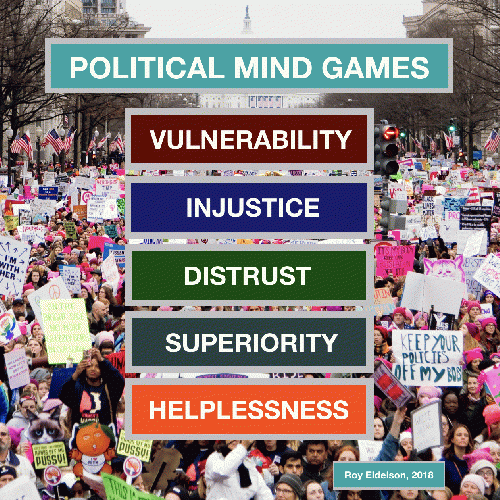Forewarned Is Forearmed
For many, the calendar's turning is a traditional time for reflecting and for resolving to act with greater decency and compassion in the new year ahead. But if history is any guide, we shouldn't expect anything of the sort from one highly influential group: those members of the so-called 1% who've long cared far more about their extraordinary wealth and power than about the common good.
These representatives of America's plutocracy--some high-profile politicians and billionaire businessmen immediately come to mind--won't change their stripes when January arrives. They'll persist in pursuing an agenda that advances their own interests while ignoring the needs and desires of the rest of us. And in doing so, they'll continue to rely on what I call "political mind games" to confuse, to deceive, and to divide--for as long as they can get away with it.
In my research as a psychologist, I've found that manipulative appeals from the 1% are often designed to target issues of vulnerability, injustice, distrust, superiority, and helplessness. That's because these are the core concerns that govern the way we make sense of the world around us. Indeed, each is associated with a basic question we ask in our daily lives: Are we safe? Are we treated fairly? Who should we trust? Are we good enough? Can we control what happens to us? By offering disingenuous answers to these questions, self-serving one-percenters aim to shape our understanding of what's happening, what's right, and what's possible to their own advantage.
Therefore, for any prospect of returning to government "of the people, by the people, for the people," it will be essential to recognize and resist these plutocratic ploys when they inevitably come our way in 2019 (and beyond). As a guide, then, here are twenty mind games to watch out for in the year ahead.
Vulnerability
"It's a Dangerous World." From unwarranted military aggression to draconian austerity measures, one-percenters will falsely argue that their actions are driven by a desire to keep us safe. They know our support for any policy is strongly influenced by whether we think it will protect us from harm. They also realize that we're quick to imagine the worst. This can make us easy prey for warnings that urge us to fall in line and follow all instructions, whatever they may be.
"Change Is Dangerous." Whether they're maligning Medicare-for-All or blocking cuts to our bloated defense budget, members of the 1% will warn of dire consequences whenever other initiatives clash with their ambitions. Regardless of the evidence, with this mind game they'll insist that such reform efforts will place everyone in grave jeopardy. Their fearmongering is designed to preserve a status quo that benefits the few instead of the many.
"It's a False Alarm." From rejecting climate science to placing corporate profits over public safety, today's plutocrats will defend misguided and destructive policies by insisting that our worries about adverse effects are overblown. Too often, we mistakenly take comfort in unfounded assurances offered from on high. When that happens, we fail to mobilize to protect the common good from those whose foremost concern is simply preserving their own extraordinary wealth and power.
"We'll Make You Sorry." Whether they're bullying of protesters or pressuring non-establishment candidates to step aside, one-percenters will turn to coercive threats and outright retaliation when crackdowns against opponents seem necessary. They command a range of resources that can be put to use in punishing those who step out of line. These risks of painful and potentially life-changing reprisals alter the stakes for both individual acts of civil disobedience and sustained collective action.
Injustice
"We're Fighting Injustice." From voter suppression to corporate school reform, representatives of the 1% will argue that their self-serving efforts are necessary to correct the unjust actions of others. But they're little different from wolves in sheep's clothing, hoping we'll lower our guard when we hear tales of their justice-seeking exploits. Their appeals aim to misappropriate and misdirect the outrage we naturally feel upon recognizing the injustices in our midst.
(Note: You can view every article as one long page if you sign up as an Advocate Member, or higher).






